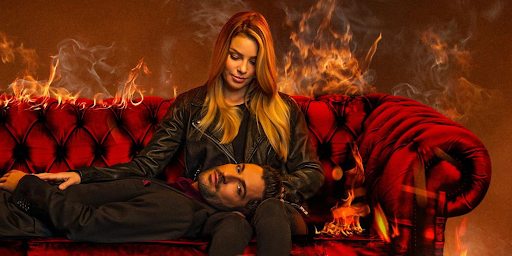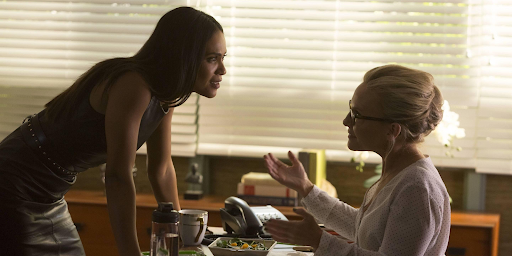Lucifer Season 5, Part 1: Devilishly Fun, Hellishly Superficial
**This is a spoiler-free review of ONLY season five. This review will contain some spoilers for seasons 1-4 of Lucifer. Any substantive plot of season five will be limited to what can be seen in the trailer.**
The COVID-19 pandemic has brought Hollywood to a standstill this past spring. The virus’ continued spread across the US halted even the most highly-anticipated productions, including the new season of Netflix’s Lucifer, a show about the Devil abandoning Hell to help solve murders in Los Angeles. The months of shutdown prompted Netflix to split Lucifer’s fifth (and possibly final) season into two separate parts. Part one of season five was finally released on August 21st, 2020 and consists of eight one-hour episodes. Only recently becoming one of Netflix’s most popular series, Lucifer shot to the top spot on Netflix within hours of season 5 being released. As a dedicated “Lucifan” myself, I was so excited to see the return of the Devil and his Earthly companions and wanted to watch the season immediately. My first reactions to the season were unfortunately average at best, but the quality did improve substantially by the end of the eight episodes. I’ll be covering the best and worst aspects of this season, as well as some of the most important story arcs along the way.
Season five begins in the wake of the disappearance of Lucifer Morningstar (Tom Ellis). While his human companions think he ditched LA to run a family business in Florida, Lucifer has been spending thousands of years overseeing the depths of Hell, as his return to the throne was required to save humanity in the season four finale. Regardless, we see how Lucifer’s disappearance has affected all of the show’s characters. To be completely honest, the first episode is nothing to write home about. The first half features way too many biblical references so that the audience really understands what show they’re watching, and the acting is just weird. It’s not necessarily bad acting, but it feels a little awkward. One thing we see from the onset of season five is that everyone has changed in the wake of Lucifer’s absence, especially the other half of the show’s shipped “Deckerstar” couple, Detective Chloe Decker (Lauren German).
Many of the otherworldly aspects of Lucifer stem from drama within the Devil’s biblical family. The show has introduced a number of Lucifer’s family members, such as his brother Amenadiel or his mother, the goddess of all creation. They’ve all played a part in Lucifer’s journey and the plans that his father, God, has in place for him. However, season five introduces archangel Michael, Lucifer’s twin brother. Without going into spoiler territory, Michael comes to Earth hell-bent (pardon the Devil pun) on ruining Lucifer’s life, which he tries to do in a variety of ways. There are definitely some issues with this season that I’ll discuss: it wasn’t my favorite by any means and I was definitely let down with the first part of season five. However, there are also some very well-executed aspects of the new episodes that deserve recognition. Sorry in advance for all the incoming Devil references.
“The Devil solving crime is the most ridiculous thing I’ve ever heard” -Lucifer Morningstar, ca. 1946
THE GOOD
Production & Cinematography
Each episode of Lucifer’s newest season reimagines their visual technique in a way that easily cements production as its best quality. The colors of Los Angeles glow brighter; the lights at Lucifer’s nightclub are more vibrant; the editing is seamless and very detail-oriented. Season five utilizes an editing style comparable to How To Get Away With Murder, with the smooth transitions utilizing movement and forced perspectives. The first eight episodes of season five also bring an eerie beauty to the murder victims: a dead DJ getting crowd surfed; a bloody bouquet of flowers that pans out into an aesthetically pleasing shot of a beautiful (but dead) woman. Lucifer is way more inventive with their crime scenes this season, a clear improvement from the generic crimes that Lucifer and Detective Decker solved in past seasons. One quality that did carry over to this season was its soundtrack. Season five utilizes a great soundtrack that both contributes to the tones of an episode and pokes fun at the topic at hand. Hearing ‘Personal Jesus’ while Chloe (who is in love with the Devil, remember) goes to investigate the murder of a nun is something that you have to smile at.
Often the cinematography, editing, and soundtrack conveyed more powerful emotion than the writing of certain episodes, making production the carrying force this time around. The inventive production in Lucifer goes to Hell and back this season, immersing viewers into each and every scene, and looking devilishly good while doing it.
Character Development
Several supporting characters are given significant story arcs in this season. The most powerful is that of the demon Mazikeen (Lesley-Ann Brandt), who has served as Lucifer’s companion since the beginning of time. At the beginning of season five, Maze helps Chloe solve cases as a bounty hunter for the LAPD, with the pair frequently hitting Lucifer’s nightclub after work. Both of them party to drown away their sorrows after Lucifer leaves Los Angeles, but as the season progresses we see that Lucifer is not the heart of Maze’s abandonment issues. These episodes bring valuable insight into Maze and break down her walls. The series has depicted her as a fearless, badass demon, but Maze’s vulnerability and the reason behind it are exposed in full detail in the newest season. Maze’s character development is very intertwined with that of Dr. Linda Martin (Rachael Harris), who finds herself navigating motherhood at the onset of season five. I’d love to go into more detail, but I promised a completely spoiler-free review…
Lucifer’s brother Amenadiel (D.B. Woodside) is also a carrying force within this season’s cast of characters. In past seasons, Amenadiel has been very boring: most of his time on Earth was spent trying to bring Lucifer back to Hell and nagging him about his Earthly habits. However, we see a shift in Amenadiel this season, most likely from him becoming a father. Amenadiel and Dr. Linda made history in season four when they made the universe’s first half-angel child, and Amenadiel’s fatherly roles are explored extensively this season. Overall, he’s definitely the most level-headed in the series, and this helps for other characters’ development. Amenadiel is an angelic voice of reason, one that helps pretty much every character overcome a personal struggle through an interaction he has with them. It’s fitting: Amenadiel is an angel, and he works miracles for both the show and its band of characters.
Tom Ellis
The actor behind Lucifer Morningstar is one of this season’s greatest strengths. While his character development was less extensive than preferred, Tom Ellis’ performance as Lucifer reminds viewers of the goofy, devilish antihero that captured our hearts back in season one. Tom Ellis embodies Lucifer in this season; not just the Lucifer that is obsessed with torture, sex, and drugs, but the Lucifer that is damaged and reconciling with abandoning his true love on Earth. Ellis conveys Lucifer’s pain and shows audiences his vulnerabilities for the first time. Seeing Lucifer break down this season demonstrates what an amazing actor Tom Ellis is. What’s even more impressive is that Ellis played two completely different roles this season. The actor acquired a completely different personality in his portrayal of Michael, even adopting an American accent for his depiction as the divine archangel.
THE BAD
Character Development (Again)
While for characters like Mazikeen the character development is incredible, for others it falls short and/or has major inconsistencies. Unfortunately, the two characters this is most prevalent with are the series’ two lead roles: “Deckerstar” itself. Both Chloe and Lucifer have very lackluster character development, and when either character did have a significant breakthrough in their personal struggles, it was almost always accompanied by two steps backward. This is expected for Lucifer because of his stubbornness, but the same effect is prevalent within Chloe, something that was very unexpected while watching through this. Much of Chloe’s screen time is occupied by complaining about something, rather than working through it with Lucifer. This is exacerbated when Chloe learns the true extent of her origin and the roles that Lucifer’s celestial characters played in it.
Additionally, Detective Chloe Decker’s character development relies heavily on Lucifer and his actions around her. However, this plays out in a very frustrating manner when the two are in the field solving cases. The two’s interactions are very inconsistent: There are some episodes where the two interact like they did in the earliest seasons; some episodes where Lucifer has matured greatly; some episodes where Chloe is the more obnoxious of the pair; and everything in between. This is okay when an episode is explicitly written in such a way, but it’s odd to see Deckerstar act arbitrarily differently and the pair’s acting feels very forced at times. On a more general note, this speaks to an overarching theme of the acting feeling inorganic in this season.
Biblical Depth
I was most disappointed with how superficial the deeper story is. In season four, so many important things happen: Chloe is reconciling with how to handle seeing Lucifer’s true form; Lucifer’s first love Eve (yes, THAT Eve. Like from the Bible) comes to Los Angeles; a priest turns Chloe against Morningstar in an attempt to send him back to Hell; and demons invade Los Angeles and nearly kill Chloe until Lucifer returns to Hell as their king. I mean, the depth of the biblical story in season four was incredible, and such a massive story, too. It involved a prophecy that forced Deckerstar apart in the name of SAVING HUMANITY.
This season just doesn’t accomplish that. Michael’s involvement quickly diminishes (although it will play a bigger role in the second half of the season), and the reasoning behind his big plan is flimsy at best. However, that’s not to say there aren’t some epic moments in this season. The increased quality of production complements celestial sequences, such as an angelic (literally) fight scene in the season’s climax. However, as a collective, these eight episodes come miles short of the story’s biblical depth showcased in seasons three and four.
VERDICT
I have very mixed feelings about this season. If you can make it through the season’s first three episodes (which I think are just... bad. Really bad.), the rest of the season gradually gets better. By episode eight, a nice precedent is set for the remaining episodes to pick up on. The first arc of Lucifer’s fifth season is a fun reminder of why viewers fell in love with Mr. Morningstar in the first place, but I think that it’s also super mediocre. This was the second season exclusively produced by Netflix, and the production budget was presumably increased massively after season four’s resounding success. While the first arc of season five is beautiful to watch, it falls short in the story arcs that should matter most. It seems there was a skewed difference in the show’s priorities with writing, with some supporting characters receiving deeper character development than the show’s title character. Nevertheless, this is still an interesting continuation of the Devil’s earthly tale, one that especially took the Deckerstar relationship to new levels despite a lack of depth within. Additionally, it leaves off on a very intriguing cliff hanger. If you’ve made it this far, here’s a hint: the next few episodes will involve some major daddy issues. The rest of season five will hopefully be released by this winter, where we’ll see the conclusion of this series and Lucifer’s ultimate fate.







